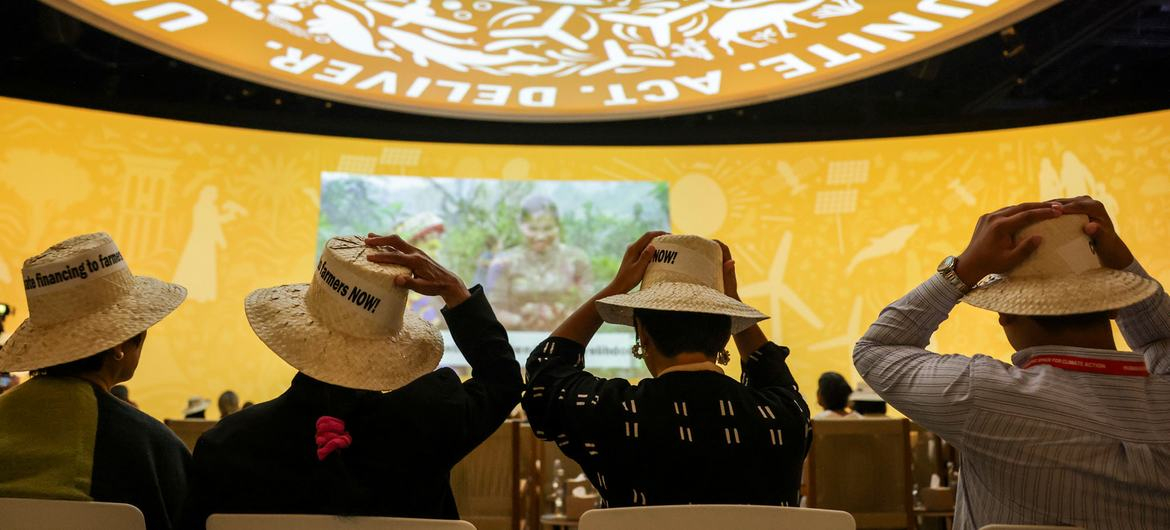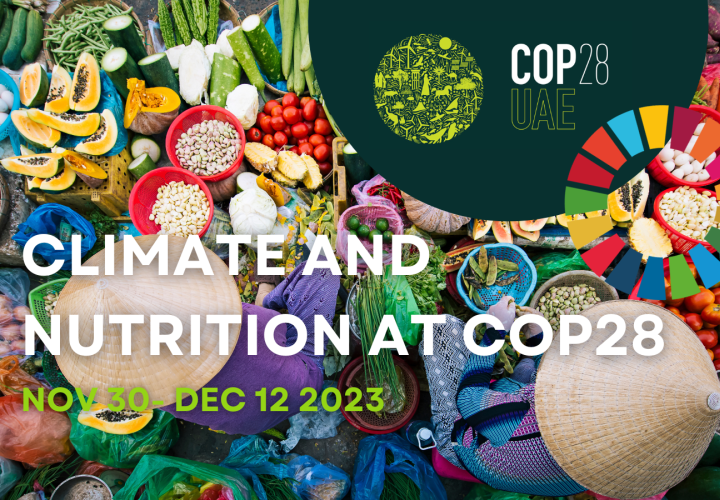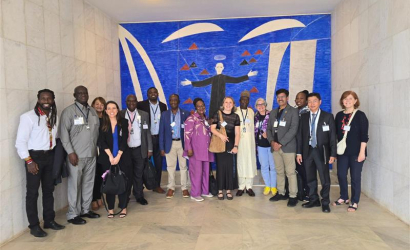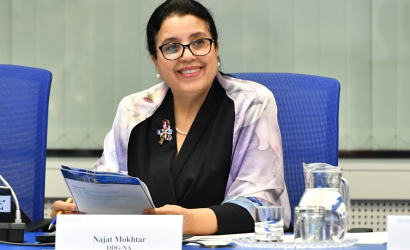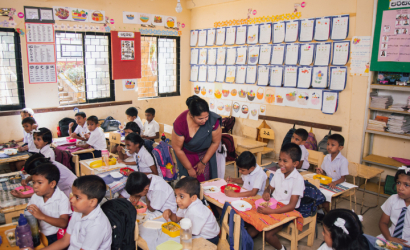This December all eyes and hopes were on Dubai to set the course for collective global action to transform food systems for people, planet and prosperity during the 28th meeting of the Conference of the Parties (COP28). As the supreme decision-making body of the Paris Agreement, COP28 united global leaders behind commitments and plans to achieve the Paris Agreement, the legally binding UN treaty to tackle climate change and limit the global average temperature increase to 1.5°C.
The intrinsic, bi-directional relationship between food, nutrition and climate has long been established through research initiatives, including the Intergovernmental Panel on Climate Change reports and EAT-Lancet Commission. Results of such initiatives demonstrate our food systems are a key determinant of malnutrition and contribute one third of global greenhouse gas emissions, as well as the great need- and potential- of food systems transformation and dietary shifts to both adapt to, and mitigate, the impacts of climate change and enhance the health of people and planet.
This year, food gained the attention it demands on the COP28 stage, and UN-Nutrition Members were on the ground championing the integration of food systems and nutrition into climate action. This included advocacy efforts for climate and nutrition and united efforts under the Initiative on Climate Action and Nutrition (I-CAN), the Coalition of Action on Healthy Diets from Sustainable Food Systems (HDSFS Coalition), the SUN Movement and the One Planet Network for Sustainable Food Systems.
“Food systems contribute to over 30% of greenhouse gas emissions, and account for almost one-third of the global burden of disease. Transforming food systems is therefore essential, by shifting towards healthier, diversified and more plant-based diets.”
Food Systems and Nutrition on the Climate Agenda
The special thematic day on food, agriculture and water, as well as the first ever thematic day on health- drew global attention to the vital intersection of climate, health and food and saw the adoption of key outcomes detailed below. Throughout the course of COP28 the call for food systems transformation for people, planet and prosperity echoed through proceedings thanks to the efforts of Member States, Civil Society Organizations, academics, philanthropic foundations, social movements and UN agencies which saw over 500 events focused on food systems transformation and nutrition. This included the UN-Nutrition supported events on Healthy and sustainable diets for nurturing people and planet’ hosted at the WHO Pavilion, as well as the HDSFS Coalition supported ‘Connecting climate action and nutrition- paving the way to healthy diets from sustainable food systems’ hosted by the EU Pavilion. Food-centric discussions on nutrition centered on topics such as the potential of shifting towards sustainable healthy diets as a solution malnutrition and climate change, the role of animal-source foods, alternative proteins, key policy actions for transformation food systems for climate and nutrition such as nutrition sensitive subsidies and social protection programmes, and importantly climate financing for nutrition following the finding of I-CAN that just 3% of Green Climate Funds are commitment to nutrition and climate actions, yet a shift towards sustainable, climate resilient, healthy diets has the potential to reduced climate change costs by $1.3 trillion USD.
Key Outcomes for Food Systems and Nutrition
- Emirates Declaration on Sustainable Agriculture, Resilient Food Systems and Climate Action: now with over 150 Heads of State and government signatories, representing over 75% of all Parties to the UNFCCC the declaration commits signatories to include food and agriculture in their NDCs by 2025, recognizing the critical role of food systems transformation in achieving global climate goals. Read more here.
- COP28 UAE Declaration on Climate and Health: Over 140 global leaders united in endorsing the declaration, sounding the alarm on the severe health implications of climate change, urgent need to confront the connections between climate change and health- including reducing greenhouse gas emissions by supporting shifts to sustainable healthy diets.
'We recognize the urgency of taking action on climate change, and note the benefits for health from deep, rapid, and sustained reductions in greenhouse gas emissions, including from just transitions, lower air pollution, active mobility, and shifts to sustainable healthy diets.'
- Excert from the Declaration on Climate and Health
- The Global Stocktake (GST): After extensive negotiations COP28 saw the adoption of the first ever GST to assess the collective progress towards implementing actionable solutions to meet climate goals. Pivotally the GST features the groundbreaking agreement to transition away from fossil fuels, and calls on countries to implement integrated, multisectoral solutions to deliver sustainable, climate-resilient food systems as a climate change adaptation measure. While this represents a giant step forward, many were left disappointed that inclusions on the phase out of fossil fuels did not go far enough, and food systems parameters did not go deeper into mitigation and efforts to deliver dietary shifts. The Global Goal on Adaptation and its framework also mark a step forward in building global resilience against the impacts of climate change and urges countries to set targets for attaining climate- resilient food and agriculture production, supply and distribution of food. Read more here.
“There is no path to achieving the goals of the Paris Climate Agreement and keeping 1.5C within reach, that does not urgently address the interactions between food systems, agriculture, and climate… Countries must put food systems and agriculture at the heart of their climate ambitions... Today’s commitment from countries around the world will help to build a global food system fit for the future”
New UN Initiatives
- FAO launched their Global Roadmap ‘Achieving SDG2 without breaching the 1.5 °C threshold’. The Roadmap identifies 20 time-bound milestones to transform agrifood systems and eliminate hunger without driving the world past 1.5 °C. This roadmap can provide guidance for implementing the Emirates Declaration, with the integration of food security and nutrition. Explore the interactive roadmap site here.
FAO also supported the development of the COP28 Food, Agriculture and Climate Action Toolkit as part of the COP28 Presidency's Food and Agriculture Agenda. - CGIAR and WFP, launched the Fragility, Conflict and Mitigation Innovation Accelerator. This new partnership will support private-sector innovators in scaling climate-smart solutions across food, land and water systems in fragile and conflict-affected communities in Africa, Asia, the Middle East and South America.
- WHO was announced as an accredited, implementing partner of the Adaptation Fund in a key stride forward to improve and protect the health of populations that are vulnerable to climate-related health risks . Read more.
- IAEA and FAO presented the new Atoms4Food Initiative that explores how nuclear science can support countries to identify and solve food systems challenges caused by climate change.
- UNEP released the special edition of the Frontiers Report ‘What's Cooking? An assessment of potential impacts of selected novel alternatives to conventional animal products’
- UNICEF released their new brief The Global Climate Crisis is a Child Nutrition Crisis: UNICEF Agenda for Child Nutrition and Climate Action which outlines their commitment to contribute to preventing child malnutrition in populations affected by climate change and mitigating the climate crisis through a five point response.
COP 28 also saw the Call to Action for Transforming Food Systems for People, Nature and Climate gain over 200 non-state actor supporters, committed to supporting the 10 priority actions. As well as the establishment of the Alliance for Champions of Food Systems Transformation. Spearheaded by Brazil, Cambodia, Norway, Rwanda and Sierra Leone, with other countries encouraged to join, this strategic coalition is supported by NSAs under the Food Systems Collaboration Network and commits to taking a ‘whole of government approach to food system transformation, and inspiring others to go further to deliver between outcomes for people, nature and climate.
What's Next?
Food is now firmly on the menu as a vital area of action to achieve global climate goals and countries have led the way- challenging themselves to do more, faster. The key COP28 outcomes represent a collective commitment to integrated action for food systems and climate, and provide powerful advocacy tools to drive forward action which delivers on these commitments at all levels. Though this is a huge step forward- we are still only at the start of the journey. While food systems action made monumental leaps within COP28 proceedings, the integration of nutrition considerations within this remains a vital area for joint advocacy. The phrase echoing through nutrition discussions was “a glass half full” – with the groundwork laid for integrated action, but much more work to do to integrate nutrition considerations into country NDCs and NAPs, and deliver on the vision of food systems for people, planet and prosperity.
Focus now turns to transforming this momentum into measurable results, with the 2024 COP29 in Azerbaijan and 2025 COP30 in Brazil serving as critical progress checkpoints. In line with their unique mandates, UN-Nutrition Members and partners stand ready to support countries in this mission, including championing healthy diets from sustainable food systems as a solution to achieve multiple Sustainable Development Goals and global climate targets. An exciting platform for this will be the scale up of the I-CAN initiative which is set to continue inspiring integrated action for climate and nutrition and monitoring change across food, health, social protection and water systems, as well as commencing country case studies for accelerated progress in 2024. Stay tuned!
Additional Resources
- Accelerating Action and Opening Opportunities: A Closer Integration of Climate and Nutrition – 2023 I-CAN Baseline Assessment (GAIN)
- Climate and Nutrition: Pathways to Impact (I-CAN, FAO)
- Healthy and Sustainable Diets: Guiding Principles (FAO/WHO)
- Nutrition and the Environment - Nurturing the planet (UN-Nutrition)
- Information brief: red and processed meat in the context of health and the environment (WHO)
- A guidance note to enhance nutrition sensitivity in Global Environment Facility investments and programming (FAO)
- IPES food | REPORT | From Plate to Planet (ipes-food.org)
- Climate change, biodiversity and nutrition nexus (FAO)
- Climate change: Unpacking the burden on food safety (FAO)
